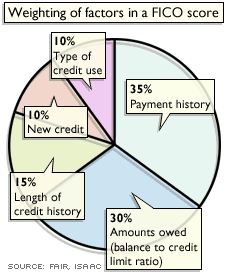Pay off debt rather than moving it around. Since the ratio of your credit card balance to your credit limit is key, closing out an account and transferring the balance simply means you increase that ratio, which is likely to lower your score. In other words, say you owe a total of $2,000 on four credit cards, each of which has a $2,000 limit. Your total credit limit is $8,000, of which your total balance ($2,000) accounts for 25 percent. If you transfer all your balances to two cards and cancel the other two, your total credit limit is reduced to $4,000, and your $2,000 balance now accounts for 50 percent of that limit.
 | |
| | |
For more info and to order your credit report with FREE credit score please visit www.reliacredit.com















